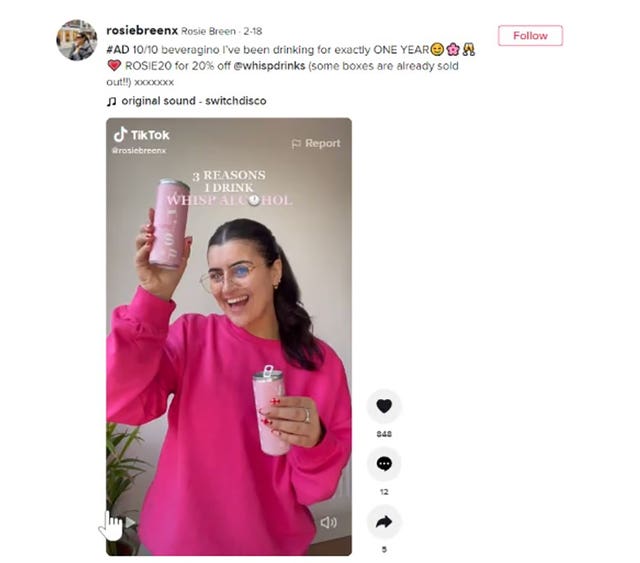TikTok alcohol post banned for low-calorie and ‘actually get you drunk’ claims
Rosie Breen’s video for Whisp hard seltzer alcoholic drinks in February was titled: 3 reasons I drink Whisp Alcohol.

A TikTok post in which a young influencer promoted an alcohol brand by saying it has “only 63 calories a can” and would “actually get you drunk” has been banned.
Rosie Breen’s video for Whisp hard seltzer alcoholic drinks in February was titled: “3 reasons I drink Whisp Alcohol” and went on to show her dancing with a can in each hand and and pointing to further captions including: “Im [sic] on my weight loss journey & they’re only 63 calories a can”, and “They actually get you drunk”.
A viewer complained that the calorie claim was not permitted for alcoholic drinks and the ad was irresponsible because it encouraged excessive drinking.

Wild Drinks Group, trading as Whisp Drinks, said it would remove the post.
Breen, who is from Basingstoke, Hampshire, and has 428,000 TikTok followers, said that at the time she was new to working with brands and unaware of the sensitive nature of the message and of advertising rules relating to non-permitted weight-control claims for alcohol products.
She apologised and said the post was a reflection of her opinion of the beverage, and that she was happy to remove it and ensure future content is compliant with the rules.
She also confirmed she was 24 at the time of the post.
TikTok confirmed the video was branded content promoting alcohol, which was globally prohibited on their platform, and had been removed.
The ASA banned the ad for making health claims about an alcoholic product, encouraging excessive drinking and featuring someone under 25.
The ASA said: “The ad must not appear again in its current form. We told Whisp Drinks and Rosie Breen not to make non-permitted low calorie nutrition claims about alcoholic drinks, and to ensure that future marketing communications for alcoholic drinks did not encourage excessive drinking or show people who were, or appeared to be, under 25 years of age in a significant role.”





